Are you planning for a Silverback Gorilla tour in Africa? Mission Africa Safaris is a tour company with over 8 years experience organizing gorilla tours and other general Wildlife safaris in East Africa. We help put together silverback gorilla safaris, nature walks, cultural visits, site seeing, birding tours and game drives to Uganda, Rwanda and DR Congo. We organize both budget gorilla tours and luxury gorilla safaris while sharing information that will help our clients prepare for memorable silverback gorilla trekking adventures to the Volcanoes national park, Bwindi Impenetrable National Park, Virunga national park, Mgahinga Gorilla National Park and Kahuzi Biega national park to see the Lowland gorillas.
Uganda, Rwanda and DR Congo are amazing countries to visit for a complete wildlife safari. In terms of biodiversity, they offer the full tour package. Visitors are always impressed with the weather and stunning scenery. They are the only countries where you can go see the endangered silverback gorillas and learn about gorilla conservation programs during your wildlife tour. Though considered developing countries, the people in the three countries are happy and very friendly to tourists.
Our team of experienced and knowledgeable staff will help you organize exhilarating mission trips to Africa, wildlife safaris and short day excursions within East and Central Africa. You can choose to go for mountain gorilla trekking combined with wildlife viewing, Chimpanzee tracking, golden monkey trekking, mountain hiking tours, birdwatching, Eco-tours, community visits or nature walks. You might even decide to go hiking Mount Karisimbi in Rwanda, the Nyiragongo active volcano in Congo, Mount Kilimanjaro in Tanzania or the Rwenzori mountains in Uganda. Then there is biking through the Congo Nile Trail on a Rwanda Safari or a weekend viewing the source of the river Nile and white water rafting in Jinja. We also arrange safaris in kenya and Tanzania.
Regardless of what you choose to do, we will give you affordable rates and options while ensure high quality and a personal touch. We have an 8 Days Silverback Gorilla Trekking Uganda and Masai Mara safari package that you might find interesting.
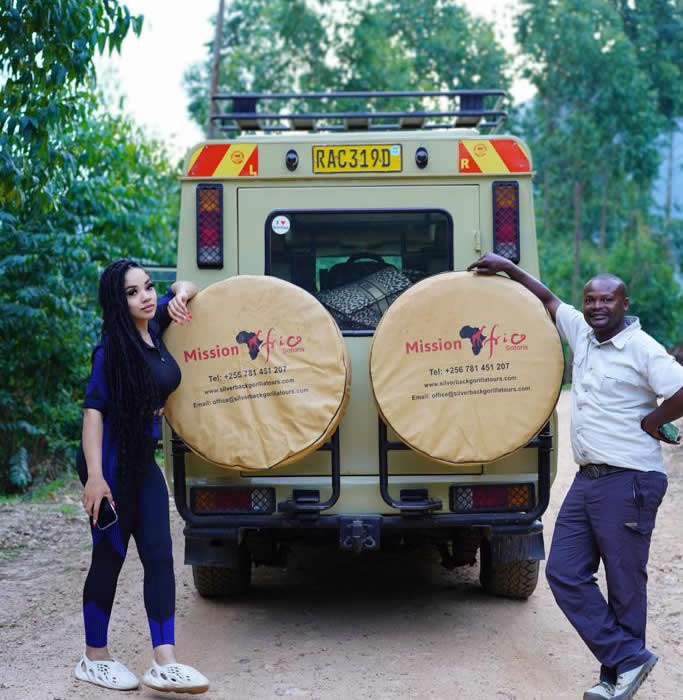
Book with us today and enjoy that dream African vacation and wildlife safari you always wanted. You can also follow us on our Facebook and Instagram pages.
Book with us today and enjoy that dream African vacation and wildlife safari you always wanted. You can also follow us on our Facebook and Instagram pages. For more information about COVID-19, get the latest from websites with the most trusted Coronavirus status reports.
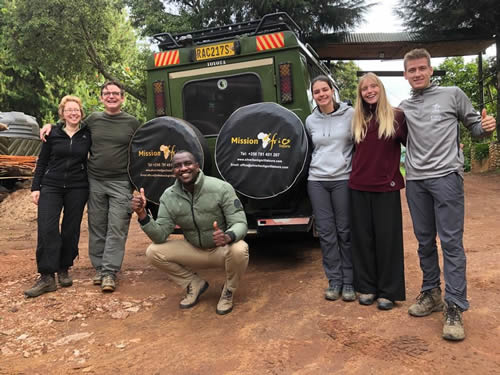
2 Days Gorilla Tour Bwindi starting and ending in Kigali Rwanda
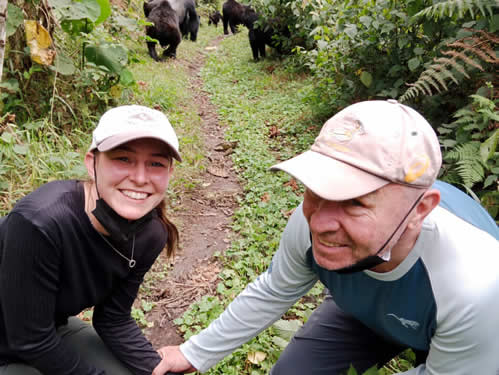
4 Days Gorilla Safari in Bwindi & wildlife Tour to Queen Elizabeth national
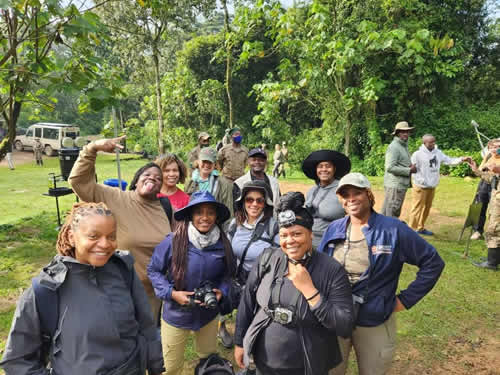
4 Days Gorilla Trekking Congo and Nyiragongo Hike
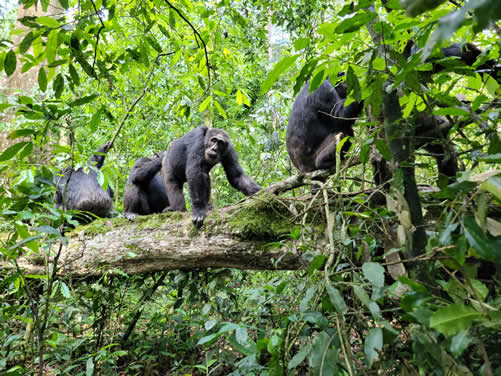
7 Days Uganda Safari Convering Chimps, gorilla tracking and wildlife
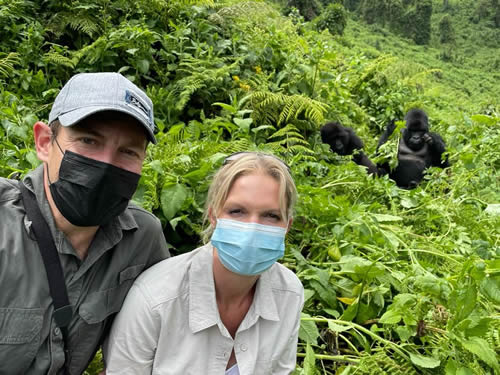
10 Days safari in Rwanda, Congo and Uganda featuring Nyiragongo
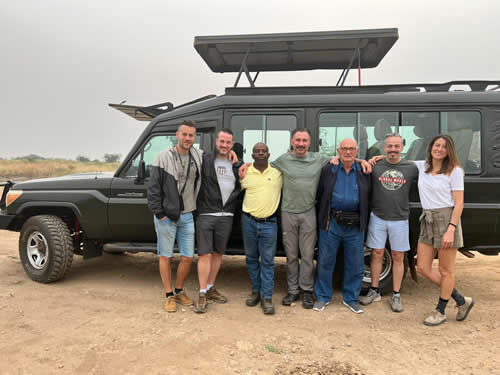
15 Days Best of Uganda wildlife safari with gorillas and chimps
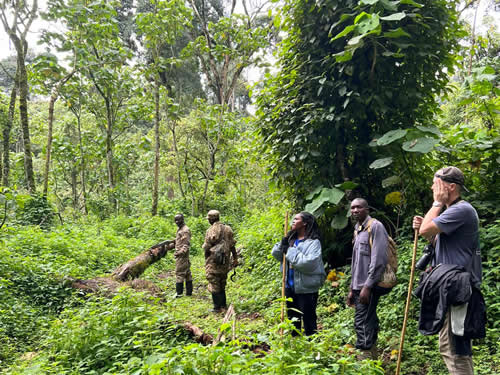
5 Days Uganda primates safari including chimps and gorillas
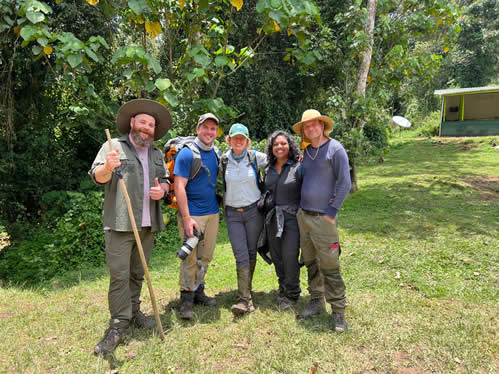
4 Days Gorilla Trekking Rwanda and Karisimbi Hiking
Silverback gorilla tours offer the ultimate wildlife experience! Whereas game drives are great, an African safari is incomplete without a silverback gorilla tour to Uganda, Rwanda and Congo. A silverback Gorilla safari takes you hiking through dense rain forest to meet face to face with wild gorillas in Africa. Trekking to see silverback gorillas in Africa or participating in the gorilla habituation experience are special and once in a lifetime experiences - You will be having a close encounter with creatures that look and behave like we humans. Is Gorilla Trekking Ethical? Yes. Because it is the only way to generate funds for gorilla conservation in these developing countries. The money raised helps protect the primates from poachers and also helps build the required infrastructure in the parks. Humans are less likely to harm the primates if they understand the benefit of gorilla trekking to their communities. You might want to see our 3 Days Uganda Silverback Gorilla Safari package.
In countries were mountain gorilla trekking is possible, gorilla tourism is far more valuable - Most visitors to East Africa come to see wild gorillas alongside other activities like golden monkey trekking, birding, mountain hiking, chimpanzee trekking or visiting the grave of Dian Fossey. We are also including cultural visits like visiting the Iby'iwacu cultural village and the Batwa among others during a Rwanda or Uganda safari. With about 28 Gorilla groups available for trekking, only 8 visitors are allowed to visit each gorilla family in a day. Gorilla permits sell like hot cake and competition for the available daily permits is high - Gorilla permits in Africa are sold on first come first serve basis. Visitor must book early in order to secure their gorilla permits. How do you find our 3 Days Silverback Gorilla Trekking Rwanda Package.
When is the best time to see gorillas in Africa? Tracking gorillas in Africa is a year round activity but the periods just after the rains are perfect for the adventure. During a silverback gorilla safari in Africa, the decision on which gorilla family to track depends on your overall fitness and preference. Some gorilla groups live near the starting points for tracking while others go deeper in the forest. In order to allow our clients get the best of both worlds, we have designed packages involving silverback gorilla safaris in all the three countries - Uganda, Congo and Rwanda. A 2 days Rwanda Silverback gorilla tour may be what you are looking for.
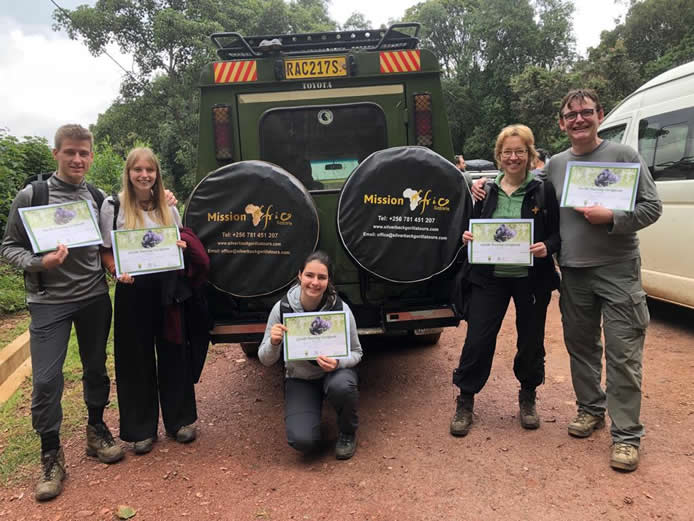
Mission Africa Safaris arranges Budget, Mid-range and Luxury wildlife tours. Our Luxury gorilla tours will exceed your expectations. With a luxury silverback gorilla safari in Africa, you get to stay in the best hotels and lodges while drinking fine wine in the African bush. Our luxury gorilla tours in Uganda, Rwanda and Congo can be arranged for individuals, families, large groups and honeymooners. Honeymoon safaris in East Africa involve special treats for lovers who want to spend their honeymoon experiencing Africa’s beautiful nature or taking part in activities like gorilla trekking. Imagine spending time with your loved one away from the hustle and bustle back in your city while watching breathtaking wildlife, relaxing on lake Kivu, enjoying the natural green African vegetation and landscape under the stars. Is there anything else more special than that? You may find our 2 Days Uganda Silverback Gorilla Tour interesting.
We have over 6 years experience organizing Mission Trips for volunteers and missionaries visiting famous religious centers like the Namugongo Martyrs shrine among others. We are experienced organizing large group tours that require great planning and coordination. Are you are tour operator with a large group visiting Uganda for a safari? We can help you organize things on the ground and ensure your clients have the best time while on a tour of Uganda. Hikers may be interested in the 3 Days Mount Karisimbi Hike.
Giving back to the community and sponsoring wildlife conservation projects
Mission Africa Safaris is a company with a big heart and known for supporting conservation and tourism related activities. We sponsor projects that enhance the lives of communities living near the game parks and reserve through the Michael Silwanyi Child Foundation which is our charity arm. We have been involved in book projects that showcase the best about Uganda while using the proceeds to help orphanages and other children. We are currently sponsoring a a groundbreaking gorilla conservation project by world renown artists Gillie and Marc. The end result of the project is the largest gorilla sculpture on earth to be installed in the Hudson Yard Park (New York City). The sculpture will raise awareness about Mountain gorillas to millions around the world. We also organize Mission Trips and partner with Volunteers and Missionaries who come to East Africa to spread the good news about Christ while building schools and visiting the less privileged. Meanwhile check our 1 Day Uganda Silverback Gorilla Tour.
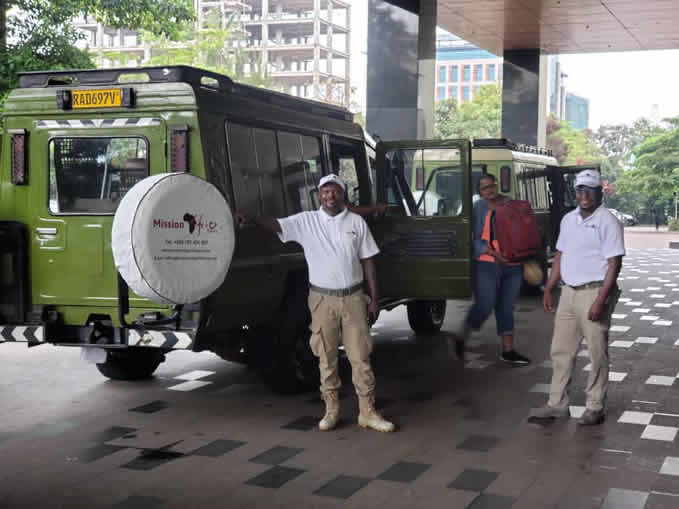
Because of their location around the equator, the climate conditions in Rwanda, Uganda and DR Congo allow Wildlife Safaris to be done throughout the year. However the best time to visit Uganda and other East African counties on a safari is during the drier seasons (January, February, March, June, July, August and September). During the drier months, the park roads are free of mud and the animals gather at specific waterholes to drink making it easy to spot them. Gorilla trekking in Africa is best done during the dry season to avoid the slippery trails typical of rainy seasons. Unfortunately the hotel rates are higher and permits for silverback gorilla tours in Africa need to be booked in advance. You might want to see our 1 Day Rwanda Silverback Gorilla Safari package.
The wet season (March to May and October to September) has its advantages especially if you are eyeing Gorilla Tours. There are fewer visitors in the park making for a more personal and private safari especially for wildlife photographers, researchers and those doing sport fishing in Uganda. Some hotels reduce their rates because there are few tourists. Birders will find the wet season amazing for birding. It is the breeding season and birds are everywhere. Migratory birds come to East Africa to escape the heat elsewhere and take advantage of the fresh fruits and insects. If you are interested in hiking check our our 3 Days Nyiragongo hike tour and the 1 Day Bisoke volcano hike. You might also be interested in more information about hiking mount Rwenzori in Uganda.
The wet season (March to May and October to September) has its advantages especially if you are coming for Africa Gorilla Tours. There are fewer visitors in the park making for a more personal and private safari especially for wildlife photographers, researchers and those doing sport fishing in Uganda. Some hotels reduce their rates because there are few tourists. Birders will find the wet season amazing for birdwatching. It is the breeding season and birds are everywhere. Migratory birds also come to the country to escape the heat elsewhere and take advantage of the fresh fruits and insects. If you are interested in hiking check our our 3 Days Nyiragongo hike tour and the 1 Day Bisoke volcano hike. You might also be interested in more information about hiking mount Rwenzori in Uganda.
The safety of our clients is paramount to us. We will ensure your safety and security by alerting you to any security situations in the country you are visiting before and during your silverback Gorilla tour. Our guides are trained to drive responsibly and ensure the safety of the client in urban areas, at the hotel and while driving through the park. Our 3 Days Murchison Falls National Park Safari package may interest you.
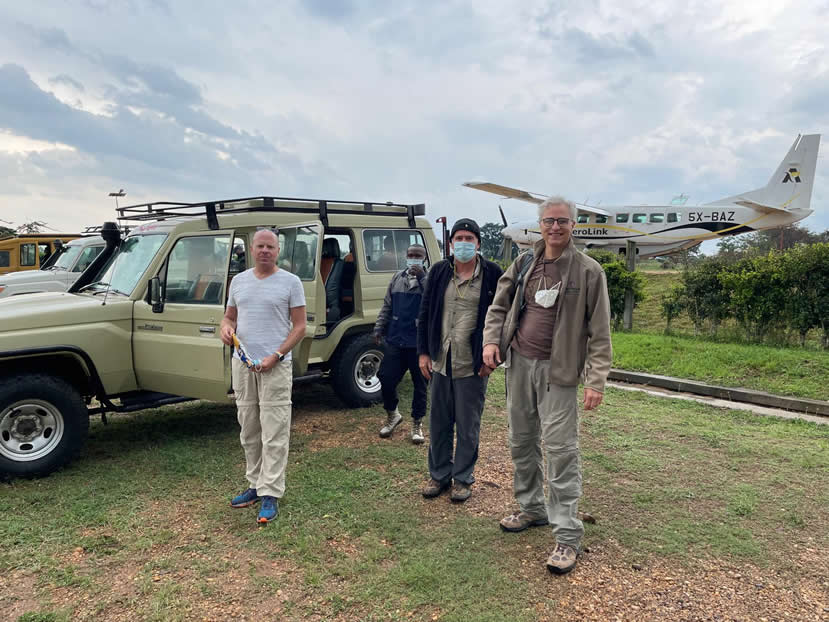
There is no continent that rivals Africa when it comes to that blend of culture, wildlife and natural beauty. Millions of tourists continue to be greatly impressed by the incredible biodiversity in Africa consisting of great landscape, spectacular rivers, lakes, green forests and of course the wild animals.
Traveling with Mission Africa safaris means adventure, fun, safety and quality services. Our experience putting together amazing tours in East Africa will ensure that your Rwanda or Uganda Safari is well planned and at affordable rates. We are aware that other tour companies may offer cheaper prices for their tours. However too cheap may come at the expenses of quality. Our prices are set in such a way that they are comparable to that of other Tour operators but do not compromise on the quality of services. In fact our budget hotels are not “budget” as such. It is a testament to the quality of our services that most of our clients are returnees or those who have been recommended to us by their friends and families.
We will ensure that we go out of our way to organize a great safari that is full of fun and adventure regardless of whether you are a budget or Luxury traveler. We create partnerships with other international tour companies, local hotels and lodges to that ensure that the best hotels are always available at the best rates. Our membership with tour operators associations and partnership with Wildlife Authorities ensure that we get access to gorilla permits even in periods when they seem over-booked. You can check out our 3 Days Queen Elizabeth National Park Safari package or the 3 Days Gorilla Habituation Experience in Bwindi?
Although we have international volunteers and partners from Europe and the US working in our office from time to time, we are a locally owned company. This ensures that you are dealing with local people who are truly passionate about their country, know the destinations in and out. Our staff know the latest developments (socially, economically and politically) in the country which is important for your own safety and adventure. African ownership ensures that more locals are given employment opportunities. By booking with us, you are ensuring that your money helps empower and support the local African people. You may be interested in our 4 Days Kidepo National Park Safari itinerary.
The tourism industry relies on trust between the company and clients. A tour company is only as good as the quality of its field Guides/Drivers. We rely on our staff to demonstrate the values of honesty and integrity while dealing with our clients. Because Guides are our ambassadors in the field, we try to work with the very best. By best we mean Drivers who have prior experience dealing with international Tourists. Our Guides are very professional, experienced, knowledgeable and passionate about their job. They are ready to share information about the places you visit and will take you to discover places that may not have been included in your itinerary. Talking about itineraries, check out our 3 Days lowland Gorilla Tour.
The office team is comprised of individuals who are well traveled and are in position to know what is best for you. We invest a considerable part of our resources on our office staff, Drivers, tour vehicles and other equipment. Our Guides are trained in defensive driving and we use a fleet of 4X4 Safari vans that are comfortable, in great condition and customized for the rough terrain in the African countryside. The privacy of our clients is ensured by assigning vehicles that are spacious, safe and reliable. We also limit the number of visitors to ensure comfort and privacy.
Mission Africa Safaris is a leading Tour company in East Africa. We help put together amazing tours for Travelers in Rwanda, Uganda, Tanzania, Kenya and The Democratic Republic of Congo. You can be one of them today!
Click below to chat on WhatsApp or send an email to office@silverbackgorillatours.com